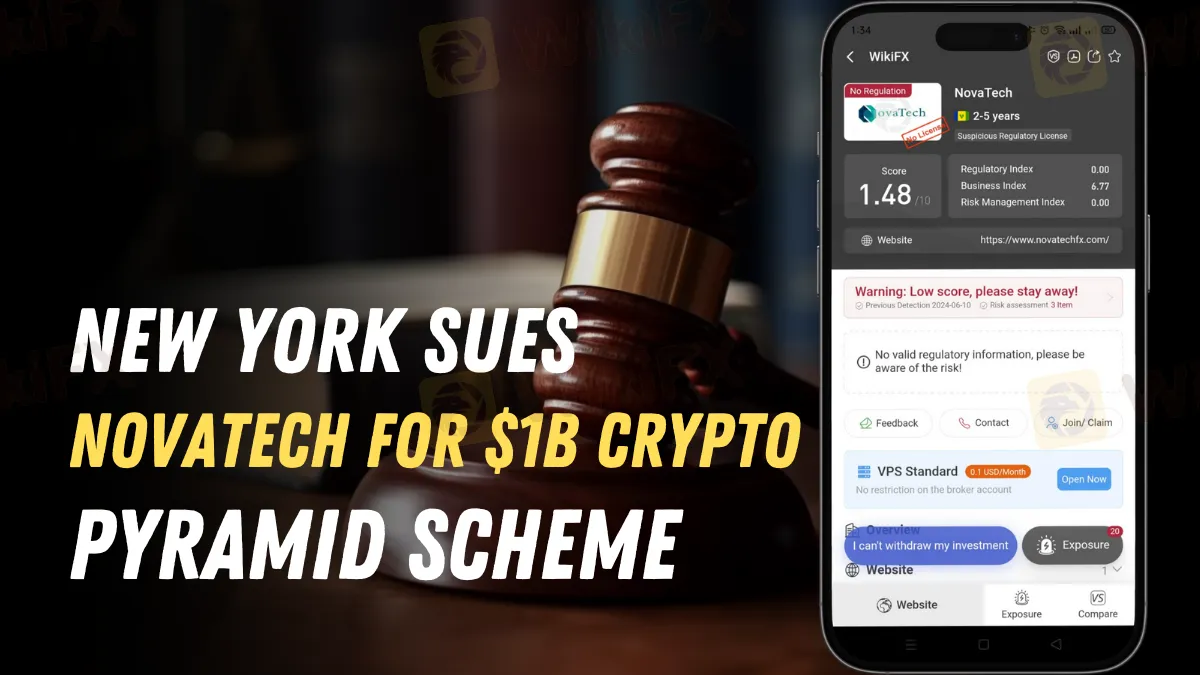简体中文
繁體中文
English
Pусский
日本語
ภาษาไทย
Tiếng Việt
Bahasa Indonesia
Español
हिन्दी
Filippiiniläinen
Français
Deutsch
Português
Türkçe
한국어
العربية
New York Sues NovaTech for $1B Crypto Pyramid Scheme
Abstract:NY Attorney General Letitia James sues NovaTechFx founders for defrauding investors, targeting minority communities, and operating an illegal pyramid scheme.

NovaTechFx is a bitcoin trade business that is being sued by New York Attorney General Letitia James for allegedly running an illegal pyramid scheme that scammed more than a billion dollars from hundreds of thousands of participants. Over 11,000 people in New York are impacted, mostly from immigrant groups, especially the Haitian community.
The case shows that Cynthia and Eddy Petion, the owners of NovaTechFx, took advantage of the trust of these groups by breaking into WhatsApp talks and prayer groups. Advertisements were written in Creole, and religious themes were used to get people to spend without them knowing it. They promised high yields. This focused method played on the hopes and trust of minority groups, which made the scam even more sneaky.
NovaTechFx was created after the failure of AWS Mining, which was another scam that the Petions helped to start. AWS Mining told investors it would give them returns of 15-20% per month and 200 percent in 15 months, but it wasn't able to make enough money to keep these claims. In 2019, it fell apart, causing owners to lose a lot of money. Even though this failed, the Petions went on to start NovaTechFx and kept up their dishonest behavior.

Between 2019 and 2023, people put more than a billion dollars worth of coins into NovaTechFx. That being said, the claim says that less than $26 million of this amount was actually traded on NovaTech's website. The money was mostly used to repay people who had invested before, which is a typical trait of a pyramid scam. The company lied about being a qualified hedge fund dealer and said it had a license to trade cryptocurrency in the U.S., which led more buyers astray.
NovaTechFx offered trade gains every week and bonuses for new employees. The promise of quick, high returns drew more people in. These gains, on the other hand, were fake. The money given to owners came from new investments, not real trade profits. NovaTech eventually went out of business in May 2023 because its business plan couldn't keep going. Tens of thousands of investors lost their money and couldn't get it back.
In the past, the Attorney General's office has taken strong action against bitcoin companies that were not what they seemed to be. Attorney General James recently got other crypto companies to pay large fines. One of these is a $2 billion payment from Genesis Global Capital. KuCoin paid more than $22 million for not being registered properly, and Coin Cafe paid $4.3 million for similar violations.
Attorney General James said that the government is committed to keeping New Yorkers safe from scams, especially those that take advantage of weak neighborhoods. NovaTechFx is being sued to hold its owners responsible and get back the money that was stolen so that the many people who fell for this complicated coin scam can get justice.
You may also access the latest forex brokers news here.

Disclaimer:
The views in this article only represent the author's personal views, and do not constitute investment advice on this platform. This platform does not guarantee the accuracy, completeness and timeliness of the information in the article, and will not be liable for any loss caused by the use of or reliance on the information in the article.
Read more

BaFin Halts USDe Token Issuance, Citing Serious Compliance Failures
The German regulator BaFin has frozen USDe token issuance amid compliance issues. What led to this drastic move, and how does it impact the market?

Hong Kong Banks and Authorities Collaborate to Freeze Fraudulent Accounts Faster
Hong Kong police, HKMA work with banks to freeze fraud-linked accounts faster, addressing scam issues while protecting the city's financial reputation.

PH Telecom Offers Free App to Protect Users from Scams
Globe Telecom partners with Gogolook to provide free Whoscall Premium Basic, enhancing digital security with caller ID, web checker, and ID security features.

Africa Cybercrime Bust: Over 300 Arrested in Fraud Crackdown
Operation Red Card sees 306 arrests across seven African nations, dismantling major cybercrime networks involved in banking fraud, scams, and phishing.
WikiFX Broker
Latest News
Forex Market Outlook: Key Currency Pairs and Trading Strategies for March 24–28, 2025
Singapore Police Crack Down on Scams: $1.9M Seized, 25 Arrested
Gold Prices Swing Near Record Highs
XTB Opens New Dubai Office
The Growing Threat of Fake Emails and Phishing Scams
Africa Cybercrime Bust: Over 300 Arrested in Fraud Crackdown
Hong Kong Banks and Authorities Collaborate to Freeze Fraudulent Accounts Faster
SocialFi and the Forex Market: A New Era for Decentralized Social Trading?
Is Billion Bucks Fx Scam?
BaFin Halts USDe Token Issuance, Citing Serious Compliance Failures
Currency Calculator







